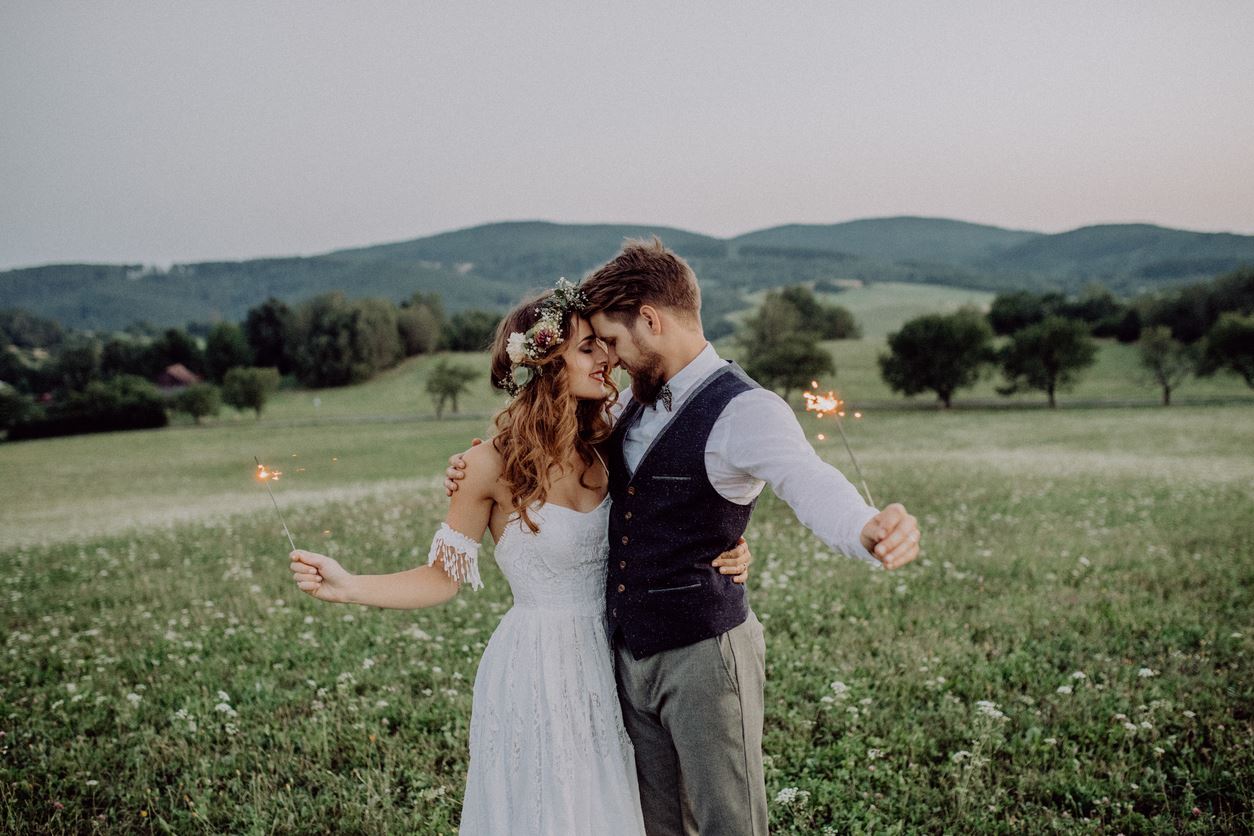Falling in love with ‘the one’ is one of life’s highlights. Getting married is often the next step in securing that love in a formal and legally binding commitment to each other. Choosing to get married is a significant life event and usually involves not only emotional commitment but financial commitment too.
 According to Moneysmart the average Australian wedding costs $36,000. Funding for the big day according to a Moneysmart survey revealed 82% of couples used their savings, 60% of those surveyed took out a loan and 18% relied on their credit card to cover the costs.
According to Moneysmart the average Australian wedding costs $36,000. Funding for the big day according to a Moneysmart survey revealed 82% of couples used their savings, 60% of those surveyed took out a loan and 18% relied on their credit card to cover the costs.
The cost of your wedding will obviously impact finances significantly, and the way in which you pay for it will make a big difference to whether you end up with debt at the end of the day. With the rising cost of living a tender topic for many, ideally you want to start married life without a big debt. So read ahead for some tips and tricks to avoid wedding debt so you can focus on Post Wedding Bliss instead of Post Wedding Bills.
Set yourself a budget - but be prepared to go over
The first step to designing the wedding of your dreams is to know how much you have to spend. Ideally draw from existing savings. If you don’t yet have money saved, consider beginning a dedicated funding campaign. Open up a high interest savings account and have both you and your partner contribute funds from each pay. Set yourselves a time based savings goal and commit to it.
Create a Pinterest board or Google drive for your big day and begin collating your ideas and vision. Research online to define your wedding style and determine cost estimates.
Once you have a budget you can carve out a financial strategy, one to be agreed upon by both parties. By deciding on a budget you are already setting up a framework to work within.
 Weddings can cost anywhere between $15,000 for small and simple to $50,000 for a more elaborate event. Each couple will have their own unique financial situation to consider. Having a set budget makes planning far simpler as it helps to guide decisions and eliminate options. For example, if your dress budget is $2000-$3000 you won’t consider (or try on) a $10,000 dress. Keep in mind, the general rule for weddings is, ‘expect everything to cost more than you expect’.
Weddings can cost anywhere between $15,000 for small and simple to $50,000 for a more elaborate event. Each couple will have their own unique financial situation to consider. Having a set budget makes planning far simpler as it helps to guide decisions and eliminate options. For example, if your dress budget is $2000-$3000 you won’t consider (or try on) a $10,000 dress. Keep in mind, the general rule for weddings is, ‘expect everything to cost more than you expect’.
Once you’ve decided on the ‘style’ of wedding you want, setting your budget will be easier. Microsoft Excel has a wedding budget spreadsheet template and using something like this will help you to work out the details. You can even watch Youtube tutorials showing you how to set it all up. Having different expense categories listed will assist you to accurately estimate the total cost of your nuptials and help prevent the figures from moving too north of your budget. Once you know how much something will cost you can budget for it.
Costs to consider
Venue hire is usually one of the most expensive wedding costs, followed closely by the catering (food and alcohol). Venues often have a package arrangement where you pay for the venue and then have a set cost per head for the catering. You will also have to factor in costs of rings, hiring a celebrant, a photographer, entertainment, wedding attire for the Bride and Groom (and wedding party if applicable), as well as budgeting for flowers, hair, makeup and accommodation. Start with your dream list and be prepared to simplify your plans if a budget blowout is looking likely. There will likely be additional unforeseen costs by the end too, so be prepared.
Ensure your visions align
 It is likely you will need to compromise in the process of planning your wedding. It’s a great introducing to married life actually. Together you need to work as a team to bring each of your own priorities into the end design. Try each writing a list of your main priorities focusing on what’s most important to you, then work together to bring both visions into the one. One partner might want a nature based wedding, while the other might really want music to the focus. So a country wedding with a DJ might be the first locked in priorities. Figure out what’s most important to you both as a couple and allocate your budget accordingly.
It is likely you will need to compromise in the process of planning your wedding. It’s a great introducing to married life actually. Together you need to work as a team to bring each of your own priorities into the end design. Try each writing a list of your main priorities focusing on what’s most important to you, then work together to bring both visions into the one. One partner might want a nature based wedding, while the other might really want music to the focus. So a country wedding with a DJ might be the first locked in priorities. Figure out what’s most important to you both as a couple and allocate your budget accordingly.
Decide on a rule for guests
The number of guests will ultimately determine the cost of your wedding. Consider carefully if all your old school friends and work colleagues need to come. If you don’t want to get into debt for your big day, keep it small and invite only your nearest and dearest. My husband and I have been married for 12 years now, but when we were planning our wedding, we determined guests based on whether we had an active social life with them. If we regularly saw our friends in social settings, they got an invite. We also skipped the cousins, aunts and uncles and only invited immediate family for an intimate wedding gathering which enabled us to keep our wedding within our small budget. The choices you make can lead to some difficult decisions, but as long as you are consistent you can justify your choices and explain if need be to disappointed parties. The exception is if parents are funding your big day, they will likely want a say in the guest list…
DIY and mates rates
 Take advantage of your contacts. Do you have a friend who could do your makeup or be your photographer? It can be nice to have someone you know take on these important roles especially if they are already on the guest list. You get to support their business and they may offer you a small discount. Don’t be afraid to delegate and ask assistance from family and friends. Does your soon-to-be Father-in-Law have access to a Ute to help transport items? Is your Mum crafty and can she help with table decorations or place cards?
Take advantage of your contacts. Do you have a friend who could do your makeup or be your photographer? It can be nice to have someone you know take on these important roles especially if they are already on the guest list. You get to support their business and they may offer you a small discount. Don’t be afraid to delegate and ask assistance from family and friends. Does your soon-to-be Father-in-Law have access to a Ute to help transport items? Is your Mum crafty and can she help with table decorations or place cards?
If you have a creative flair, consider doing your own flowers. I did. We visited the Sydney flower markets a couple of days before our big day (after researching what flowers we wanted). This can be a more sustainable and far cheaper option. Consider arranging simple stems in recycled glass jars and juice bottles as your table arrangements (ask your friends to collect them for you). I also made my own bouquet and did my own makeup. We got my husband’s mum to make us a simple orange almond cake. We saved well over $2000 by doing all of these things ourselves. I did get my hair done professionally and was glad to have made that investment. I made my own gifts for guests (handmade bath salts in cute jars) and decorated the venue myself with some assistance from my sister and mum. Of course, some venues don’t give you much freedom, but we chose a venue that was basically an empty shell and we had to bring in everything (including a fridge!).
The venue will very much determine what you can and can’t do yourself, so consider this when deciding on a venue. Many brides do not want the stress of having to do anything themselves, and want to just focus on enjoying themselves. Avoid doing anything you don’t think you’ll enjoy and delegate or outsource instead, just know you’ll be paying for it.
Keeping costs down
The day you decide to tie the knot will have an impact on cost. Choose a mid-week lunch do over a weekend dinner affair and you’ll shave plenty off the cost. Cocktails and canapés are more budget friendly than a sit down three course meal. The season also plays a role in cost. Summer, late Spring and early Autumn will always cost more than a Winter wedding. Your wedding doesn’t have to be a big fancy affair. You could do a picnic in your parent’s garden or a stylish registry wedding in town (packages start at $400) and go out to dinner afterwards.
Getting into huge amounts of debt from a wedding really doesn’t make sense and will cause unnecessary stress on your relationship. The most important thing is to find a way to celebrate your love for each other with your nearest and dearest and to have fun.
Alison Gallagher is a freelance writer, resourcefulness expert and entrepreneur. She has been featured in various publications including Stellar Magazine, Australian Health and Fitness Magazine, and Cleo Magazine. Alison is particularly passionate about sharing practical tips on how to live simply, sustainably and seasonally.







